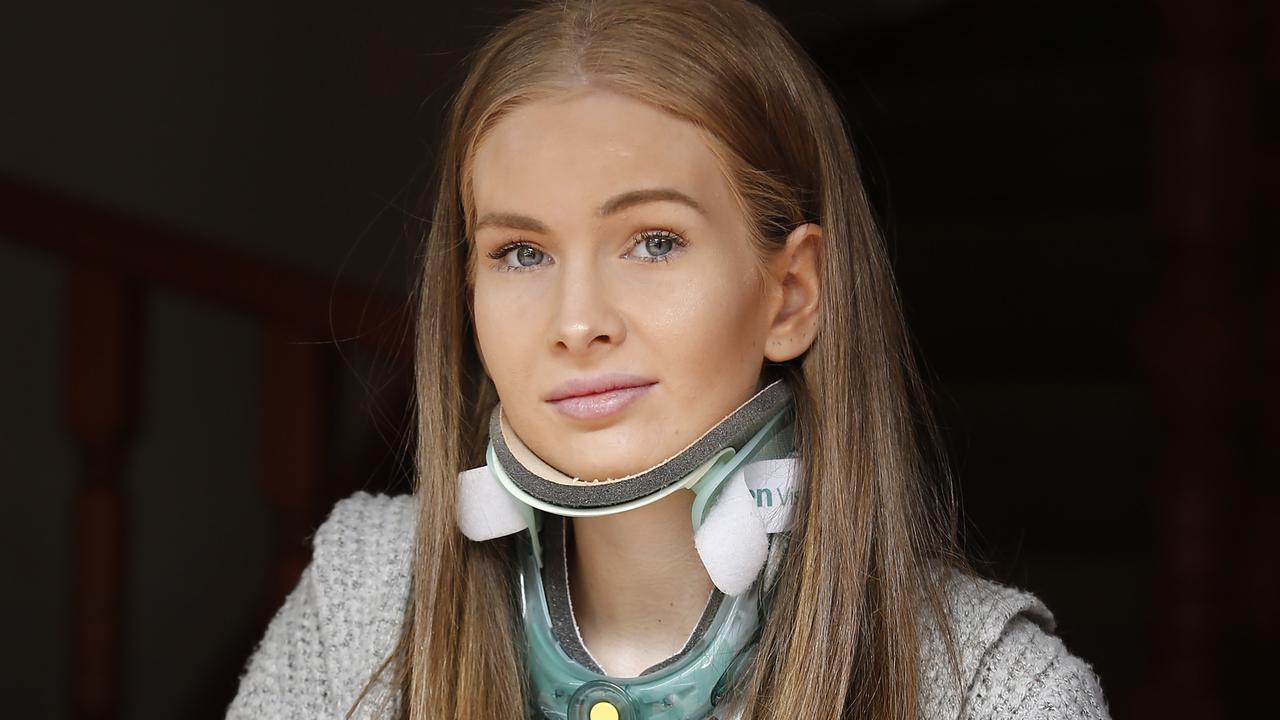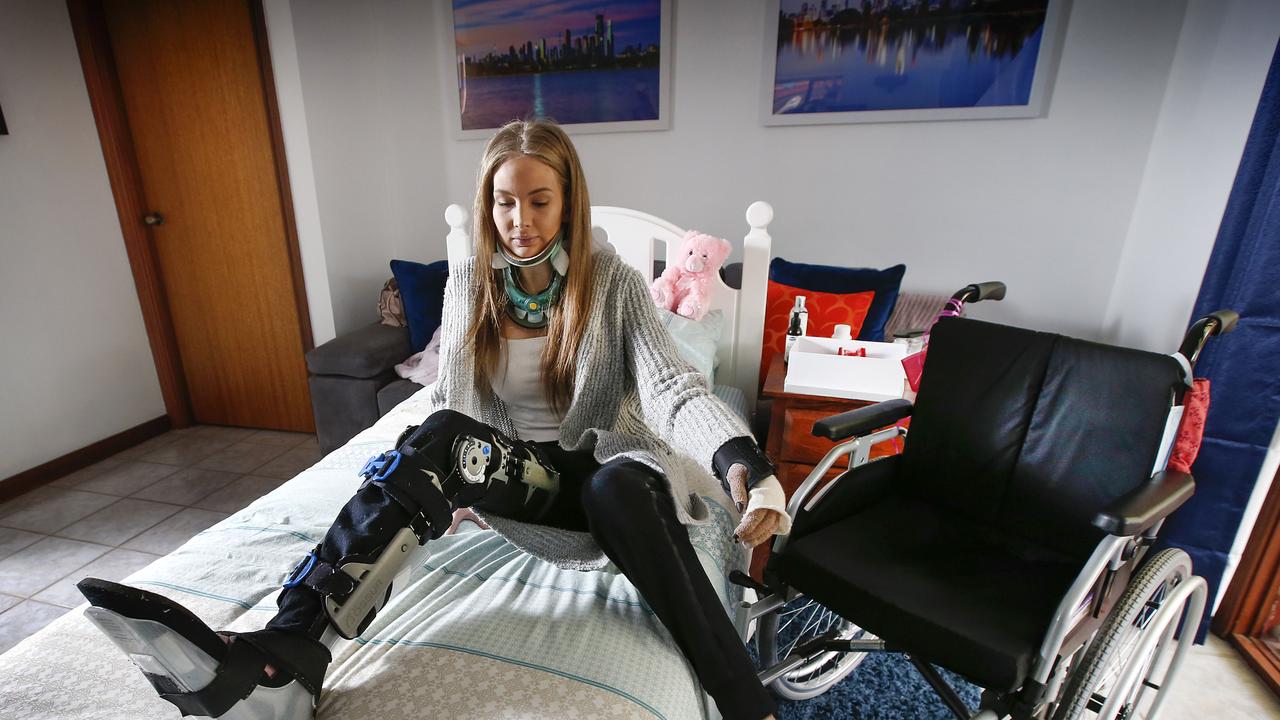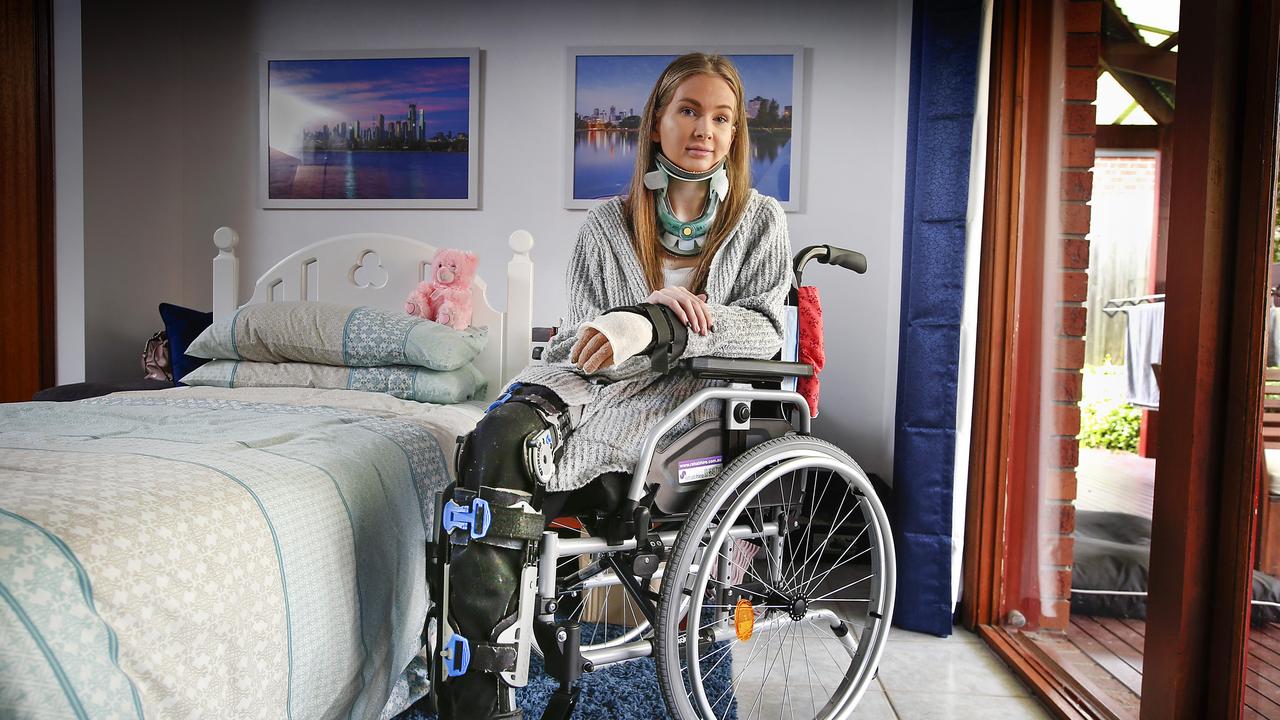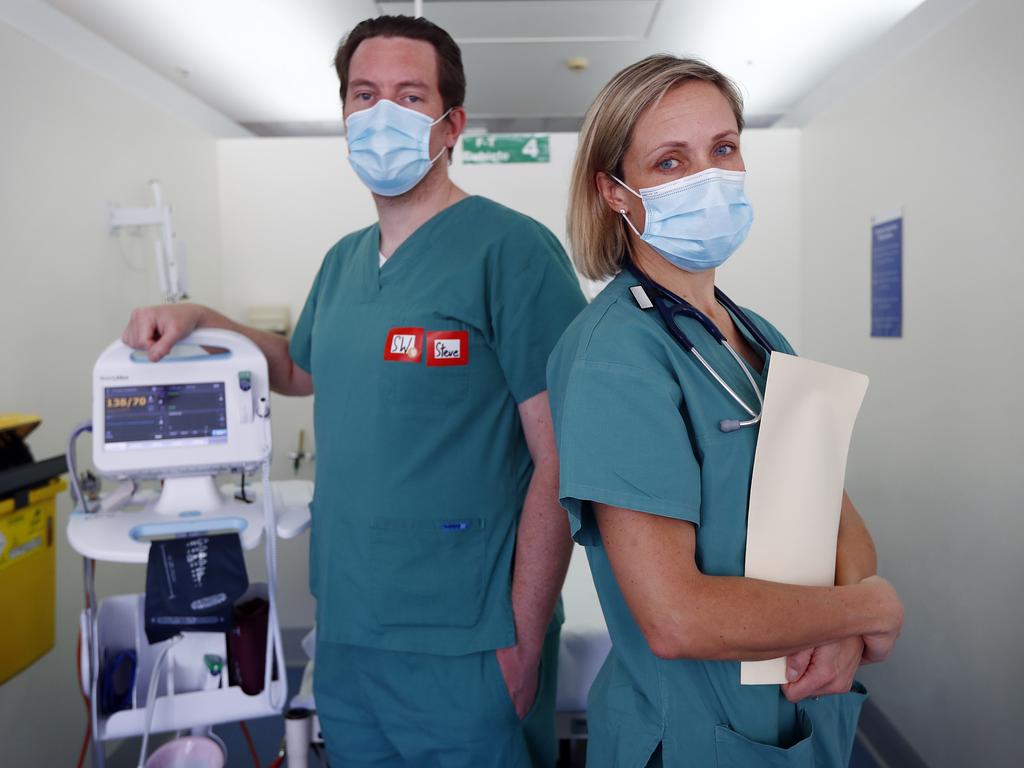DV victims jump from apartments to escape abusive partners
Georgia Brodrick has been left in a wheelchair after having to jump from her apartment balcony to escape her allegedly abusive partner. Another woman took the same action a month earlier. It comes as a major Sydney hospital has recorded a dramatic spike in domestic violence cases during the COVID-19 pandemic.
News
Don't miss out on the headlines from News. Followed categories will be added to My News.
A 22-year-old woman hurled herself from her eighth storey balcony and suffered horrendous injuries because she felt it was the only way to escape a dangerous relationship.
Georgia Brodrick claims the abuse was so bad, and help so limited, that she had no other option but to jump from the Melbourne CBD apartment building on July 17.
Ms Brodrick was arguing with the partner when things took a horrible turn for the worst.
“He would sit at the front door and beg me to stay. He’d take my phone off me so I couldn’t call my parents. He’d smash it so it wouldn’t work. I was so trapped,” she told The Sunday Telegraph.
“We were fighting that morning because he’d cheated on me. I called my dad and said: ‘Can you please come and get me, he’s getting violent again’.”

Ms Brodrick said she struggled to recall what happened next.
“I had a shower and I don’t really remember the rest because my brain has blocked out the trauma but after that I jumped,” she said.
“He pushed me to that point. I felt like there was no way out of the relationship.”
Ms Brodrick jumped from the balcony, landing on a fence before “bouncing off” into a ditch.
“The doctors said I had a 10 per cent chance of surviving the fall. I was in a coma for seven days with a broken back, neck and leg,” she said.
“I will hopefully be able to walk in a few months. I don’t know whether I will be able to use my arm again because of the nerve damage.”


Wheelchair bound, Ms Brodrick stayed in the trauma ward for three weeks where she was fed through a tube before being released to her parents.
“It’s a miracle I survived. I feel like it’s now my time to raise awareness for people in toxic relationships,” she said.
“I don’t think I realised how much I was being manipulated. It makes me so upset. No one should feel like that.”
He has not been charged by police.

Her advice to others feeling trapped or abused by their partner was to “get out of there”.
“Call the police. Don’t tell them you’re leaving. You should never get to the point of feeling suicidal because you‘re trapped. There’s always a way out,” she said.
Ms Brodrick said she was happy to have survived.
“I feel like I’m not controlled anymore. He’s not telling me what I can or can’t do. Where I can or can’t go. I couldn’t walk down the street or get my eyelashes done without him,” she said.
“I’m really positive about my future.”
Her desperate response to an allegedly physically and emotionally abusive relationship is not an isolated incident.
A 34-year-old Bankstown woman took the same drastic action to escape her partner a month earlier, prompting NSW Police to take action.

A violence restraining order is still in place which prevents Jason Peter McAuliffe from assaulting, harassing or intimidating the woman, his partner of nine months.
According to tendered court documents, McAuliffe accused his partner of hiding his medication, before choking her on the bed on June 17,
The documents allege McAuliffe “positioned himself on top” of the victim, before choking her seven times for at least 20 seconds, slapped her and punched her in the face.
The victim tried to escape through the front door but was yanked by her hair back into the apartment by McAuliffe, according to court documents. She managed to run to the main bedroom, before he allegedly locked her inside.
Fearing for her safety, she opened the window, pushed the flyscreen out and jumped to the pavement, fracturing her vertebrae, police allege.
McAuliffe was later charged with a string of offences including assault occasioning bodily harm, detaining a person to obtain an advantage and dishonestly obtain a financial advantage. Police have sought a 10-year restraining order on behalf of the woman.
If you are in immediate danger, call the police on triple-0. Call the NSW Domestic Violence Line on 1800 65 64 63 if you are experiencing domestic abuse.
DOMESTIC VIOLENCE HITS A NEW COVID HIGH
A major Sydney hospital has recorded a dramatic spike in domestic violence cases, with the number of victims increasing nearly five-fold during the COVID-19 pandemic.
St Vincent’s Hospital’s domestic violence service treated 43 victims in July, compared with nine for the same period last year, with the number of cases last month also up from 2019, jumping from 19 to 45.
A six-week trial of a new DV screening program in the hospital’s emergency department has also found one in 10 patients revealed they were or had been in an abusive relationship.
Emergency medicine staff specialist Nikki Woods said COVID-19 had created a “boiling pot” effect for victims living with violent partners.

“The stress of people losing their jobs with drug and alcohol and mental health all spiking as well – it all just compounds – and then the environment in the home just becomes a boiling pot,” Dr Woods said.
Emergency department and intensive care unit social work team leader Stephen Freeman agreed.
“When the pandemic first hit in February and March, we in the social work department noticed that the majority of the work we were doing in the emergency department on the weekends was responding to domestic violence,” he said.
“Before it was part of our job but it was certainly becoming more of our job.”
Mr Freeman said the DV screening pilot program, which he hoped would become standard practice, involved questioning every patient over the age of 16 years if current or past partners had been violent.
Clinical staff had also been trained to spot DV red flags including repeated presentations to the ED and difficulties separating patients from their partners for confidential conversations.
“I think traditionally we’ve been very good at identifying when people present with significant injuries,” he said.
“But there has been a bit of a hidden group of people who aren’t presenting with injuries but presenting with other physical symptoms like abdominal pain, drug and alcohol and mental health concerns.
“The aim has been to try and also identify that group of patients.”
Dr Woods said the patients had been “incredibly willing” to answer the questions and “think it’s a really good thing that we’re doing”.
“The tool that we’re using covers not just physical violence but emotional abuse as well,” she said.
Originally published as DV victims jump from apartments to escape abusive partners






